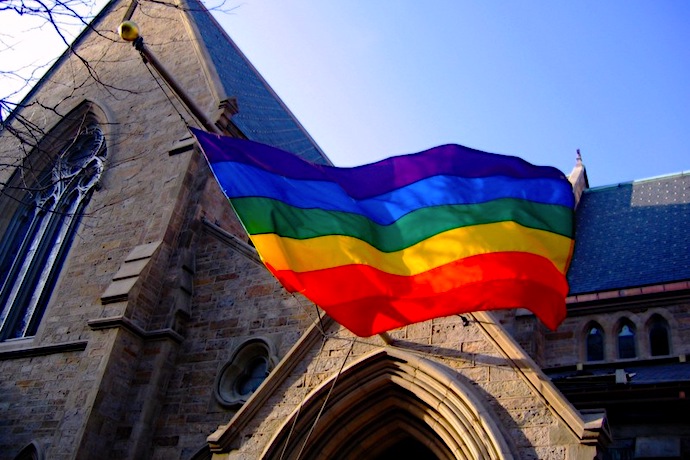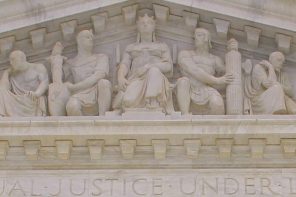Recently, the Chronicle of Higher Education ran an article about Joseph Kuilema, a professor at Calvin College who was fired for officiating at a same-sex marriage ceremony. The article begins with a deeply problematic assertion validating a homophobic understanding of Christianity that’s both harmful to the LGBTQ community and offensive to many Christians.
The article states that:
“Kuilema’s case highlights a quintessentially contemporary dilemma for Christian colleges, one that pits an institution’s conservative adherence to Scripture against the more progressive belief that people of faith should fight for marriage equality as a fundamental civil right.”
The tacit claim—all the more problematic for being presented as a truism rather than a position in need of defense—is that adherence to Christian scripture necessitates opposition to marriage equality, with the additional implication that supporters of marriage equality like Kuilema are choosing not to adhere to scripture (a claim that Kuilema and many of the Calvin faculty who supported him would probably find concerning).
A more accurate statement would be that the case pits an institution’s conservative adherence to a particular interpretation of scripture against alternative interpretations. Perhaps this is what the Chronicle article intended and it was simply worded imprecisely. Nevertheless, the distinction is vital and we wish to emphasize it.
In contrast to the implications of the article, for many Christians the choice isn’t between adhering to scripture and supporting marriage equality. Rather, the choice is between narrow, ahistorical interpretations of scripture and alternative interpretations of scripture that consider the cultural and historical circumstances of biblical authors. To many Christians today, a broader and historically informed understanding of the Bible reveals that it contains few potential references that are directly relevant to current debates over marriage equality.
Moreover, as scholars such as Saul Olyan, Dale Martin, and Stephen Moore have shown, even those few references that are potentially relevant to modern debates (Leviticus 18, Romans 1, 1 Corinthians 6, 1 Timothy 1) are anomalous and/or ambiguous and/or part of mythologies or discourses that few contemporary readers recognize and fewer would endorse. Indeed, biblical writers offer little moral guidance concerning marriage at all. When they do, argues biblical scholar David Balch, they typically stress how married people can be virtuous according to the standards of their existing social order (not the standards of the more just world God and humans might prefer and not the standards of American society). The writer of 1 Peter, for example, exhorts couples to live up to elite Roman family values (wives submit to husbands, slaves submit to masters, all submit to the king) so that his Christian readers will be esteemed rather than reviled by their neighbors.
In The Erotic Word: Sexuality, Spirituality, and the Bible, seminary professor David Carr considers the most famous biblical couple, Adam and Eve, as a paradigm of marriage. Carr argues that their story conveys the message that finding a life partner is a gift from God, not that God is obsessed with the genitalia of partners. For many Bible-reading Christians, the message that God wants humans to love God and one another and to enjoy abundant life in spite of human frailty and other obstacles is central to scripture. From this perspective, any interpretation of scripture that fosters the opposites—any reading that makes one love God or neighbor less or diminishes human flourishing—is unbiblical.
This attitude toward scripture goes back at least as far as Augustine of Hippo’s On Christian Doctrine and finds a recent application to sexual ethics in pastor Nadia Bolz-Weber’s Shameless: A Sexual Reformation. To many Christians, denying another person the type of life-enhancing life-partnership legally available to oneself seems anything but loving, and thus it is opposition to, not support for marriage equality that represents a failure to adhere to scripture. In short, it is not correct to say that opposition to marriage equality is the biblical position; many Christians read scripture differently.
Systemic injustice is often sustained not so much by vigorous defense as by assumptions of its legitimacy. Whether intentionally or not, by implying that adherence to scripture entails opposition to marriage equality, the Chronicle establishes a dichotomy between faithfulness to scripture and support for marriage equality that many Christians reject as false.
No doubt, some Christians feel an obligation to oppose marriage equality based on their readings of scripture. It is equally certain, however, that other Christians support marriage equality because of their commitment to scripture, not in spite of it.
Opposition to marriage equality is a position adopted by some Christians who respect the authority of scripture; it is not the position adopted by Christians who respect the authority of scripture. To uncritically accept that adherence to scripture necessarily entails opposition to marriage equality is dangerous for the LGBTQ community, disrespectful to millions of Christians, and factually incorrect.



